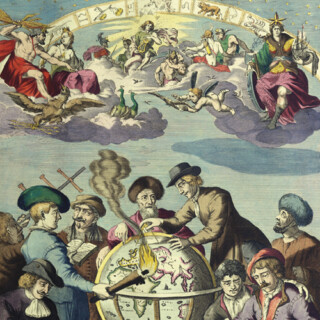A fine portolan by one of the most prolific chart makers of the Mediterranean
[Plan des cotes de la mer mediterranee].
[?Messina,
c1595].
Pen, ink, and wash colour on vellum, extending west to east from Cape Finisterre to the Holy Land, and north to south from the Adriatic to the north coast of Africa, islands in red, blue and gold, rivers in blue, numerous coastal place-names in red and sepia in semi-italic lettering, six large and small compass roses all with fleur-de-lys north points, heightened in gold, Christogram to neck, image of Calvary to the Holy Land, the whole chart divided by red, green, and sepia, rhumb lines extending from the compass roses, gilt borders, scale upper left, lower left and lower right, a few small holes right portion of chart, one to left portion.
200 by 460mm. (7.75 by 18 inches).
11860
notes:
Finely drawn chart of the Mediterranean attributed to Joan Oliva.
The chart has been attributed to Joan Oliva (fl.1570-1614), a leading member of the Oliva family, a cartographic dynasty who dominated portolan production in Europe during the sixteenth and early seventeenth centuries. Charts signed by no fewer than 16 different members of the Oliva family are recorded between 1538 and 1673, and individual members apparently worked throughout the Mediterranean worl...
The chart has been attributed to Joan Oliva (fl.1570-1614), a leading member of the Oliva family, a cartographic dynasty who dominated portolan production in Europe during the sixteenth and early seventeenth centuries. Charts signed by no fewer than 16 different members of the Oliva family are recorded between 1538 and 1673, and individual members apparently worked throughout the Mediterranean worl...
bibliography:
Richard L. Pflederer, Census of Portolan Charts & Atlases, (privately published, 2009); Pflederer, Finding Their Way at Sea: The Story of Portolan Charts, the Cartographers who Drew Them and the Mariners who Sailed by Them, (Houten: Hes & De Graaf, 2012), 98.
provenance:







![[OLIVA, Joan] [Plan des cotes de la mer mediterranee].](https://i0.wp.com/crouchrarebooks.com/wp-content/uploads/2025/03/11860_1H.jpg?fit=1700%2C776&ssl=1)
![[OLIVA, Joan] [Plan des cotes de la mer mediterranee].](https://i0.wp.com/crouchrarebooks.com/wp-content/uploads/2025/03/11860_2H.jpg?fit=1700%2C768&ssl=1)
